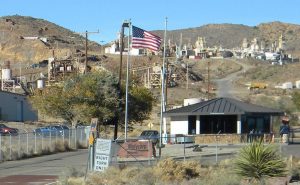By Mercy A. Kuo
Trans-Pacific View author Mercy Kuo regularly engages subject-matter experts, policy practitioners, and strategic thinkers across the globe for their diverse insights into U.S. Asia policy. This conversation with Jane Nakano – senior fellow with the Energy Security and Climate Change Program at the Center for Strategic and International Studies (CSIS) and formerly with the Office of Policy and International Affairs in the U.S. Department of Energy – is the 240th in “The Trans-Pacific View Insight Series.”
Explain the objective behind the U.S. Defense Department’s investment in Mountain Pass mine in California.
The Pentagon recently awarded funding for feasibility and engineering studies at the Mountain Pass mine in California as the first step in the Trump administration’s effort to re-establish a domestic supply chain for rare earths. The Mountain Pass mine had been a leading global supplier of rare earth minerals until the 1990s, but stringent domestic environmental regulations reduced the commercial viability of its rare earth production business, forcing the United States to become highly import dependent, mostly on China. In fact, over the past few decades, China has emerged as the dominant supplier of rare earths, accounting for about 85 percent of the global capacity to process rare earth ores and about 80 percent of rare earths supplies imported by the United States — the point of concern that the Pentagon aims to rectify through the grant program.
What is the impact of the Pentagon’s rare earth mining efforts on California’s clean energy industry?
Rare earths are critical for renewable power generation equipment like wind turbines that California is known for. Also, the state is a leader in the development of clean energy technologies, such as electric vehicle batteries, with many innovation hubs and research entities. The uninterrupted availability of these critical minerals at an affordable price is important for the clean energy industry to thrive. The Pentagon efforts could result in re-establishing domestic rare earth capacities that can reduce the risk of potential supply disruptions.
The aim behind the Pentagon effort, however, is to secure the rare earth supplies for defense applications. Whether and how well the size of processing and separation capacities that are required for the defense applications align with what is needed for clean energy applications warrants closer examination before fully ascertaining the effect of Pentagon efforts on California’s clean energy industry.
Explain the strategic relevance of rare earths in the U.S.-China tech race.
Clean energy technology is a growing industry, as their deployment has become key to mitigate the worst effects of the global climate crisis. The growing importance of such technology has elevated the strategic value of rare earths as they are critical ingredients in clean energy technologies. Today, the United States and China are among the leading countries on clean energy technology innovation, development, and deployment. For example, the two countries accounted for about half the $282.2 billion that were invested in renewable energy capacity worldwide last year, according to BloombergNEF.
The Chinese have long recognized the strategic value of rare earths, as exemplified by a famous quote from 1992 by Deng Xiaoping, “The Middle East has oil. China has rare earths.” Fast-forward to the present, and strategic materials like rare earths are considered to be a major field for industrial development as well as foundation for the development of other fields that are promoted under Made in China 2025 — the Chinese government’s 10-year plan released in 2015 that seeks to modernize the country’s manufacturing base by rapidly developing 10 high-tech fields.
Assess how U.S. efforts will impact global supply chains in the clean energy and rare earths industries.
The Pentagon plans reportedly entail an additional, separate process of awarding funding towards the construction of rare-earth processing capability in the United States. If successful, the plans could alleviate the current concern over the security of rare earth supply for American manufacturers of clean energy and defense equipment, and may also foster the development of additional manufacturing activities along the domestic rare earth supply chain. Diversification of suppliers is rarely a negative trend for the security of a supply chain.
Meanwhile, how the resurgence of U.S. rare earth supply chain would affect the global clean energy industry would depend in part on whether U.S. supplies would be free of export restriction. Moreover, it is not clear as to how the U.S. efforts may stimulate private investment, which may be needed for these rare earth operations to become commercially viable and sustainable for the clean energy industry. Countries and states are undergoing a period of significant economic uncertainty from the COVID-19 pandemic. How the pandemic-induced economic downturn may affect the scope of investment available for rare earth industry as well as the competitiveness of clean energy sectors warrants close attention for some years to come.
Why should U.S. and Western policymakers be concerned about China’s dominance in the rare earths market?
The concern over Chinese dominance in the rare earth market stems from uncertainty concerning China’s future as well as its long-term relationship with the Western world. For example, at one of the heightened phases in the U.S.-China trade war last year, President Xi Jinping of China and his top trade negotiator visited Jiangxi province, known for its rare earth wealth. The visit was widely interpreted as a reminder to the United States that China has leverage over both the rare earth supply chain and the high-tech industries, bringing back the memory of China’s 2010 ban on rare earth exports to Japan when bilateral ties deteriorated over a territorial dispute. Concerns persist among the American and Western policymakers that heavy economic dependence on China for something as critical as rare earth minerals may translate into a vulnerability that can be exploited by China in the event of a major clash between China and the West.

No comments:
Post a Comment